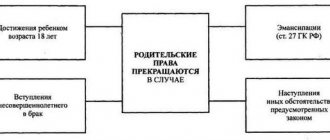Children who, due to a combination of circumstances, are left without parental care can be adopted by other people. Adoption can be formalized either by one parent, for example, when a single mother gets married and her husband wants to officially recognize paternity of someone else’s child, or by a married couple who takes a minor from their orphanage. In both cases, this procedure is not just a mark in the passport, but much more.
The honorary title of mom and dad is not only the rights that adults receive in relation to the adopted child, but above all, responsibilities.
Of course, not everything in life does not always go smoothly and smoothly, therefore, when taking responsibility for someone else’s baby, you need to think more than once. It is not for nothing that the adoption procedure itself is quite complex and confusing; it allows you to give a reprieve for adults who have decided to become adoptive parents. In addition, the guardianship authorities have the opportunity to understand whether the declared adult can become a responsible parent.
But life is complex and unpredictable, and it may happen that the obligations taken have become an unbearable burden. Is it possible to abandon an adopted child? How to carry out this procedure, and what consequences await refusing adoptive parents?
Rights of an adopted child during divorce and after
As mentioned above, an adopted child has all the same rights that are due to a child born into this family.
This applies both to the rights that he has when his parents live together, and to the rights that the child has after his parents’ divorce.
Expert opinion
Stanislav Evseev
Lawyer. Experience 12 years. Specialization: civil, family, inheritance law.
In particular, an adopted child, even after a divorce, retains:
- the right to material support: both parents are obliged to provide financial support;
- right to education: the minor must still be given sufficient time;
- the right to protect his interests: no one has the right to infringe on the rights of a child just because he is adopted;
- the right to communicate with both parents;
- all other rights enshrined in the Family Code of the Russian Federation.
Thus, the legal status of an adopted son or daughter is completely similar to the legal status of a child born in or out of wedlock.
Find out more about the rights of parents to a child after a divorce in the Russian Federation.
Judicial procedure for cancellation of adoption
If parents abandon a previously adopted child, they can do this only through the courts.
Regardless of who exactly is the filer of the claim, the procedure for carrying out the cancellation is always the same.
We offer step-by-step instructions on how to abandon an adopted child:
- Collect documentary evidence that what is being claimed in the claim occurs. We’ll talk about the completeness of the documents separately.
- Write a petition addressed to the judge, which will outline not only the grounds for deprivation of the parent’s rights, but also provide other important arguments.
- Submit papers to the court. If the applicant is not among the persons who have the right to do so, he should first contact the guardianship council or the prosecutor.
- Participate in court hearings.
- Wait for the decision to be made and help the relevant authorities put it into effect.
Not everything is as simple as it may seem; in order to fully consider the issues, various witnesses may be involved and documents may be requested, and the process itself can take months.
Which court should I go to?
Jurisdiction for this type of case lies with district or city courts. The petition must be submitted at the place of residence of the defendant. If the address of the responding party is unknown, then it is possible to file a claim at the place of residence or registration of the applicant.
The applicant must have maximum information about the defendant; this allows the process to be expedited and carried out correctly. Do not forget that the judge can ask the opinion of even the most minor what he thinks about everything that is being declared. True, this can only be done if the child is over 10 years old.
Another important point is the fact that you can only give up an adopted child if you are a minor. If he is already over 18 years old, then it is impossible to make such demands.
What documents should I prepare?
The documentary base is presented in full. Without it, the claim will not be accepted for registration and consideration. The list of required papers includes:
- Passport data, usually these are photocopies of the passport, the applicant and the defendant.
- Previously registered adoption form.
- Birth certificate of the baby.
- A certificate from the housing office about the minor’s current place of residence.
- Certificate of inspection of the premises.
- Medical reports and certificates.
- Income certificates.
The completeness of the papers directly depends on the conditions that became the basis for the cancellation of parental rights.
Is it possible to abandon an adopted child after a divorce?
Unfortunately, this question is often asked to lawyers by fathers leaving their family, and some unscrupulous mothers are also interested in the possibility of “returning” a once stranger’s child back to the orphanage.
There may be several reasons for such unpleasant behavior or one of the above:
- The adoption of a child was the initiative of one of the spouses or was caused by circumstances affecting only one of the spouses. A typical example is female infertility, due to which the child was adopted, and after the divorce the husband wants to cut off all ties with the offspring who is alien to him by blood.
- One or even both of the parents strive to get rid of the “burden” both materially and morally, especially if they have not reached mutual understanding with the child.
- The decision to adopt was mutual, but a new life allows you to reconsider it with a new partner, and the child only gets in the way.
Since life situations surprise with their diversity, one should not condemn such a decision. Adoption, like any other form of family arrangement, is based on the principle of voluntariness.
Therefore, adoptive parents have the right to abandon the child at any time before he reaches adulthood.
Cancellation of an adoption can only be done in court, and the adoptive parents are among the persons who have the right to apply to the court with such a demand.
Who can demand cancellation of adoption?
To begin the process of canceling a previously established adoption, its initiator is required, that is, the person who will actually file claims of the described nature. According to the legislative acts of the Russian Federation, not every person can become such an initiator.
The list of people who can make such an application includes:
- Baby's mother. As, for example, in the case of deprivation of the rights of a man to whom she was previously married and who, after a divorce, does not want to fulfill his fatherly duty.
- The father of the child if the mother behaves inappropriately.
- Representatives of the guardianship council, when any caring person contacts them and confirms the information provided.
- The prosecutor, also if there is an application addressed to him from neighbors or relatives. A lawsuit is filed only if there is a collected evidence base.
- A minor who has reached the age of 14 years.
In any outcome of events, the submitter of the claim must have strong justification for the demands expressed on paper. He is obliged to first collect documents that will present the evidence base. Usually, when resolving this issue, the applicant enlists the support of representatives of the guardianship authorities. Together, preparations are being made for the future trial.
Is it possible to cancel an adoption after a divorce?
The law does not provide for the direct possibility of canceling adoption due to divorce. But interesting explanations are given by the Supreme Court of the Russian Federation in Resolution of the Plenum of April 20, 2006 N 8 (as amended on December 17, 2013) “On the application of legislation by courts when considering cases of adoption of children,” which states that the court, guided by the norms of Part. 2 tbsp. 140 of the RF IC, has the right to cancel adoption in other cases.
As practice shows, the initiative to cancel adoption is not always based on the divorce of the adoptive parents. Sometimes situations arise when the normal development and upbringing of a minor is not possible.
An example is given:
- discovery of a serious mental or physiological disability in a child that interferes with normal development (not reflected in the medical records of the minor at the time of registration of adoption);
- lack of mutual understanding and authority of the adoptive parent as a parent, precluding full upbringing.
The court is obliged to ask the child his opinion if he is 10 years old at the time of consideration of such a claim.
Based on the provisions of Part 2 of Art. 140 of the RF IC, the court may well take into account the mutual reluctance of the adoptive parents or the reluctance of one of them to take part in raising a child who is a stranger by blood and cancel the adoption.
Important! The court cannot force adoptive parents to continue to fulfill their parenting responsibilities against their will. Since leaving a child in an unfriendly family atmosphere can lead to psychological trauma.
Grounds for cancellation of adoption
Abandoning an adopted child is a procedure no less complicated than the adoption itself. This needs to be understood in advance, before taking the child. Even without touching on the purely psychological problem that the parties will have to endure when canceling guardianship, refuseniks will have to face considerable legal difficulties of this process.
Cancellation of adoption falls into two main categories:
- At the request of the parents themselves.
- At the insistence of other interested parties.
Regarding the first category, let’s say right away that it is almost impossible to relinquish parental responsibilities unless there are very compelling reasons. At the same time, the bad behavior of children, their frequent illnesses, poor social adaptation are not the points to which one can appeal in case of refusal. But the impossibility of raising oneself alone due to divorce or when a serious illness is discovered in a parent can be considered, but is not always satisfied.
Much more often, adoption is canceled by force. To do this, the following conditions must be present:
- The father or mother leads an immoral lifestyle, is a drug addict, alcoholic, or has other unhealthy addictions.
- Child abuse was detected.
- Parental obligations to provide the child with everything necessary and raise him are not fulfilled.
- Parents are declared incompetent and therefore cannot take care of minors.
It is often practiced to abandon a child in favor of another adult who wants to adopt him.
How to cancel the adoption of a child during a divorce
The subtleties of canceling adoption through the court are reflected in Art. 140-143 of the RF IC and concern both a brief description of the cancellation procedure and all the consequences that will occur for both the child and the parents.
Algorithm of actions
Procedure for the adoptive parent to cancel the adoption:
- Collection of documents.
- Preparation of a statement of claim.
- Payment of state duty.
- Trial.
- Obtaining a court decision.
- Contacting the registry office to make changes to the birth certificate of the child.
The following may file a claim to cancel an adoption:
- adoptive parents of the baby;
- the child's blood parents;
- prosecutor;
- guardianship and trusteeship authorities at the child’s place of residence;
- adopted himself if he is 14 years old.
The grounds for third parties to bring such a claim to court may be:
- malicious evasion of adoptive parents from fulfilling their duties towards the child;
- cruel treatment of a minor;
- chronic alcoholism or drug abuse;
- abuse by adoptive parents of their rights to the child.
Important! The list of grounds for canceling an adoption in the RF IC does not include the desire of the adoptive parents to abandon the child after a divorce, although the law does not directly prohibit going to court with such a demand.
Most often, one of the child’s adoptive parents files a lawsuit to cancel the adoption against the second parent.
Example. The S. couple adopted 4-year-old Maxim in 2013. In 2021, the marriage between spouses S. was dissolved, the ex-husband left the family and ceased to be interested in the child. In 2021, the ex-wife filed a lawsuit to cancel the adoption against her ex-husband, indicating that he was shirking his responsibilities as a parent. The court, having examined the materials, canceled the adoption, but collected child support from the negligent parent.
Much less frequently, courts consider general claims by adoptive parents to cancel adoption due to a broken relationship. In such a situation, the child is indicated as the defendant.
Procedure
The procedure for considering a claim to cancel an adoption differs from those usual even for lawyers in family disputes quite significantly.
When preparing a statement of claim for cancellation of adoption, it is worth remembering the following features of this procedure:
- the prosecutor and the guardianship and trusteeship authorities must participate in the court hearing;
- if the claim is filed by the adoptive parents, then the defendant is a minor child, whose interests are protected by the prosecutor and guardianship authorities;
- Claims in this category are considered only and exclusively in the district court at the child’s place of residence.
The courts are not constrained by their right to independently determine whether the arguments listed in the claim constitute an obstacle to the normal upbringing and development of the child. The court can also collect alimony from former adoptive parents, canceling the adoption.
This obligation will remain in effect until the child is adopted again (if this happens, of course).
Alimony cannot be recovered if the reason for canceling the adoption is misrepresentation regarding the child’s health status. For example, if a child was diagnosed with HIV infection, the guardianship department should have warned about the possibility of infection.
Also, financial security is not collected if the initiator of the process is a child who wants to return to his birth family.
Statement of claim for refusal (cancellation of adoption) of adoption
The claim for cancellation of adoption is drawn up taking into account the strict requirements of Art. 131-132 of the Code of Civil Procedure of the Russian Federation and presented to the district court at the defendant’s place of residence.
When choosing a defendant, you should consider:
- if a claim is filed by one of the adoptive parents to cancel the adoption in relation to the second adoptive parent, the defendant will be the adoptive parent, who is planned to be deprived of the status of a parent;
- if the claim is filed by two adoptive parents, then the defendant will be the adopted child, whose interests will be protected by the guardianship and the prosecutor.
The claim must indicate:
- name of the judicial authority and address of its location;
- information about the plaintiff and defendant: full name, registration address and actual residence;
- third parties: municipal guardianship authority and prosecutor;
- circumstances of the dispute (when the marriage was concluded, when it was dissolved, when the child was adopted, other circumstances relevant to the case - who initiated the adoption, whether the adoptive parent against whom the claim was filed was against);
- reasons why the adoptive parent should be deprived of the right to the child;
- evidence and references to law, documents, practice;
- demand addressed to the court;
- list of documents attached to the claim;
- personal signature and date of drawing up the statement of claim.
The statement of claim is drawn up in printed or handwritten form. However, lawyers still advise printing out the document - this will prevent it from returning to the form of unreadability.
A claim to cancel an adoption can be filed either in person at the court reception desk or sent by registered mail via mail.
An example sample is posted below.
If a claim is filed by two adoptive parents, it is strongly recommended that you seek advice from a qualified attorney. This will help you avoid possible mistakes and make it easier to protect your rights.
Cancellation of adoption, termination of guardianship
Everyone has already figured out what “adoption” and “guardianship” are and how they differ from each other. But what happens (from a legal point of view) when the adoptive parent or guardian, for one reason or another, terminates the relationship with the child?
When we talk about the cancellation of adoption or termination of guardianship, we must first of all understand that these events are completely different. They have different legal consequences and completely different legal sources, that is, what they can be composed of. At the same time, visually it can be almost the same thing: the child was in the family, and then ended up not in the family, and you were told that your guardianship was canceled or your adoption was terminated. But, see above, these events are completely different
.
If you remember what I said about what adoption is and what guardianship is, then you will quickly remember that when adopted, the child becomes yours, that is, he has parents - you, as well as grandparents. With guardianship, this does not happen; the child remains, as it were, “state”, and you remain only his guardian. Therefore, the consequences of canceling an adoption and ending a guardianship are completely different.
Cancellation of adoption
If we cancel the adoption, then everything goes back to normal
.
First: a child who lived under your last name, for example, Ivanov, becomes (by his old last name) Petrov. In some cases, the court may preserve the surname and first name assigned to him during adoption, but in general cases the child returns to his old full name.
Second: the child again has those parents whom we usually call “biological”, and you, as parents, disappear.
The third consequence of canceling the adoption is that you will most likely pay alimony for the maintenance of this child in the same way as parents who have been deprived of parental rights in relation to their children do.
The fourth consequence that the cancellation of adoption entails is almost always a loss of rights to a certain extent. You will never be able to take custody or adopt anyone again.
An adoption can be canceled for a number of reasons. Let's divide them into two groups:
The first group of reasons for the cancellation of adoption are the same reasons that we talk about when we talk about deprivation of parental rights, that is, when the child is not taken care of, when the child is homeless, when the situation reaches such a state that there is no other way to help the child, except to deprive him of such parents/adoptive parents. This is a last resort. There are very few such cancellations of adoptions in Russia, I don’t think this is your case. You just need to know about it.
The second group of reasons for the cancellation of adoption is the cancellation of adoption on the initiative of the adoptive parents themselves. It really is possible. Just as an ordinary parent may refuse to raise his child (though in this case he will not be “automatically” deprived of parental rights, but over time he will still be deprived), so an adoptive parent may refuse to raise a child for some reason. Come to court and say that you no longer want to be an adoptive parent. In this case, the court, of course, will cancel the adoption, because “you can’t force yourself to be nice,” but canceling the adoption will entail the same consequences as when depriving parental rights, that is, most likely, alimony will be collected, most likely you will not be able to adopt and take custody of no other child.
There is a group of reasons for cancellation of adoption, called “not the fault of the adoptive parent.” To put it very roughly, this is when they “slipped you a defective child.” The adoptive parent can go to court and say that he was not aware that, for example, the child has HIV, and cannot raise a child with such a diagnosis, so let's cancel the adoption. Or suddenly the child has a “heredity” (the doctors will say more precisely), which had not manifested itself before. But such situations are extremely rare; medicine currently believes that we can talk about hereditary diseases only in extremely rare cases. Otherwise, this is not a hereditary history, but simply illnesses, and it is natural for a person to get sick. Therefore, there are not very many cancellations of this kind.
There are also groups of situations when a parent asks to cancel the adoption because “they don’t get along.” In such a situation, the courts, as a rule, collect alimony, and do not consider that it is not the fault of the adoptive parent. You are an adult and by accepting a child for adoption, you are taking a very important step. You must clearly understand that there is no turning back. Despite the fact that the legal “path” has been trodden, the consequences will be great both for you and for the child who will again end up in a child care institution.
So, the adoption is cancelled:
- only by court decision;
- only for global serious reasons;
- Cancellation of adoption has great legal consequences for you as an adoptive parent.
Termination of guardianship
Here, too, you need to understand that this is a completely different legal institution than the abolition of adoption. The first thing you need to understand is that the cancellation of adoption is a legal procedure that takes place in court, in the manner of litigation: that is, you sit, there are parties, you talk about something, someone brings some evidence, representatives of the parties speak, you have the opportunity to use the services of a lawyer, you can ask to postpone the meeting, provide some evidence to substantiate your position, etc. And the termination of guardianship is not carried out by a court decision, but by the decision of the guardianship and trusteeship authority
. Just as easily as you were given a child under guardianship, the guardianship authorities can also take this child away. Those. One decision of the guardianship and trusteeship authority with the signature of the director is enough to take the child away and terminate the guardianship.
This is both good and bad.
First, let's look at the conditionally “good” moments.
First, guardianship is an obligation that a person undertakes voluntarily
. One of the principles of guardianship and trusteeship is that it is assumed voluntarily, and in the same manner it can be voluntarily relinquished. If some reason prevents you from being a guardian in the future, you have the right to refuse this guardianship. But not in such a way as to bring the child into custody by the hand and say that I refuse, but, of course, there will be a certain procedure and it is absolutely unlikely that this will be accepted in one day. However, you have the right to refuse guardianship. You need to understand that if the reasons for which you refuse do not seem valid to the guardianship and trusteeship authorities, you may have difficulties, incl. the inability to accept another child into the family if you ever want to.
The guardianship authorities can judge very sensibly: if it didn’t work out with one child, where is the guarantee that it will work out with another? Therefore, it cannot be said here that guardianship is so simple: if you wanted it, you carried the child for a year, then returned it and took the next one. But in principle, the law provides that the duties of guardianship and trusteeship are voluntary.
There are situations in life when, for some objective reason, you cannot continue to be a guardian. We are all mortals, some of us sometimes have poor health, sometimes it happens that a huge number of other family responsibilities appear in the family, and indeed the child who was under your care can no longer be with you. I don’t know for what reasons, I’m not specifically citing them, but they must be significant. In this situation, you can refuse guardianship without any legal consequences for yourself. I emphasize once again that this is a voluntary matter.
Situations when people refuse guardianship are quite rare and attract close attention from the guardianship and trusteeship authorities. And, of course, they are carefully looking into why and why this happened. You won’t have this opportunity to pick up a child and return it like you would to a store.
.
There are other grounds for terminating guardianship.
First of all, this is the return of the child to the birth family. Those. after the child returns to his parents or his adoptive parents (yes, there may be situations when the adopted child was also under guardianship), guardianship will indeed be cancelled. Guardianship will be canceled due to circumstances beyond the control of the guardian, therefore, other than gratitude, the guardianship and trusteeship authorities will not feel anything else towards you. Because in general, it is much better for a child to live in a natural family with his ordinary parents, with his ordinary family environment, in good conditions, if this is the case. If this is not the case, then the child is under guardianship. But if suddenly his family has found resources within itself, has recovered and is ready to take the child back, and the child himself wants this, then the guardian has no reason to object to the child being back in his birth family and having the opportunity to be raised by his own, and not by surrogate, parents. In such circumstances, after the child returns to the birth family, the guardianship and trusteeship authorities decide to terminate the guardianship of this child by the guardian or trustee.
Such situations, again, arise infrequently, but there are a number of foster families in the Russian Federation who set as their professional task the work of returning the child to the birth family. Maybe this is you in the future, maybe you will know such families, but, in any case, you must keep in mind that such a situation is possible.
It happens that a child returns to his birth family, but not to his mother, for example, but to his grandmother. And you, as a guardian, agree with this. In this case, your guardianship will also be terminated.
An important point to take into account: all these events - voluntary termination of guardianship - take place only in the case of guardianship or trusteeship. And in the case of a foster family, you need to understand that termination of the foster family agreement is possible only for good reasons
, that is, you cannot explain this by some little thing, the reasons must be even more significant. You cannot, as with guardianship, explain your refusal to raise a child by the fact that, for example, the child does not fit into the family after a month. Sometimes psychologists advise that in this case it is better for the child, before he begins to adapt to the family, to return back to the place from which he was accepted and then figure out what to do with him. Such situations happen, it is sad, however, they require a certain courage of the guardian. And it seems to me that if a specialist advises you to do this, this is one of the correct options for behavior. Under such circumstances, it is sometimes more honest to return the child to the place from which you took him than to try to glue something that does not stick together. If it is not possible for your family to adapt this child, then the sooner you, with the help of specialists, understand that further is no longer possible, the better.
Once again: with guardianship, you can refuse guardianship for some reasons of your own; in principle, you don’t have to explain them. If you don’t want to tell your guardianship your family situation completely, for example, that you adopted a child a month ago, and now your daughter is pregnant with triplets, and you understand that after six months you will get a situation where you will simply break up, or you will not be able to “drag” the children, and you make the difficult decision to return the child. You don’t have to tell this situation in full to the guardianship and trusteeship authorities; you have the right to refuse without much explanation; you are not required to have a valid reason. If you have a “foster family” form of arrangement, you will be required not only to explain, but also to prove that the reason for which you are terminating the foster family agreement is valid. Maybe the “birth of triplets” in some cases will be considered a valid reason, but in some situations it will not. This will be decided by the guardianship authorities.
Now a large group of reasons for termination of guardianship - the so-called. cancellation of guardianship due to the fault of the guardian.
This happens when the rights and interests of the child under guardianship are somehow violated. Here you need to understand that the decision on whether the rights of the child have been violated or not and whether there are grounds for termination of guardianship is made by the guardianship and trusteeship authority. Yes, in this matter you are dependent on the guardianship and trusteeship authority. Yes, their subjective view will determine whether the rights of the ward are violated or not. It's your risk. When you sign up to be a caregiver, that's also what you sign up for. Of course, there is no specially developed methodology for guardianship authorities to “spread rot” on guardians or interfere with their lives, but you need to understand that your situation depends, among other things, on these employees. And here, when people worry about not spoiling relations with the guardianship authorities, I partly agree with them. Indeed, employees of the guardianship authority decide whether the rights of the ward are violated or not.
So, if one of the guardianship authorities, namely the manager, comes to the conclusion that the rights of the ward have actually been violated, guardianship can be terminated due to the fault of the guardian. In this case, the child will again end up in a state organization for children left without parental care, and the guardian will most likely face a trial. Because the act of the guardianship authority to terminate guardianship can be appealed to the court, which I strongly recommend doing if guardianship is terminated due to your fault. If you do not agree with this, you can go to court, you have the right to do so.
Guardianship can be revoked on grounds related to violation of the rights of the ward. What are these reasons? This is the same as what we said about deprivation of parental rights, that is, substitute parents in the form of guardians do not take care of the child, do not give him enough food, do not do enough to educate him.
Another group of reasons are financial violations, situations when guardians waste the property of the ward or, for example, spend the money that the state pays for the maintenance of the child on something else, or cannot account for this money. Because the guardian's report takes place.
If the guardianship and trusteeship authorities come to the conclusion that the child’s rights have been violated, a resolution/order or other act will be issued stating that your guardianship will be terminated due to your fault. The legal consequences here are as follows: if guardianship is terminated due to the fault of the guardian, he, in the future, just as in the case of cancellation of adoption due to the fault of the adoptive parent, cannot claim to be a substitute parent in any form. If we are talking about financial violations, the guardianship and trusteeship authorities can go to court against the then-current guardian on behalf of the child with a claim for compensation for losses caused to the child by the actions of the guardian. You need to understand that this kind of thing rarely happens, most likely you will not encounter it. Most likely, the main problem may arise in how you and the guardianship authority will look at what is good for the child and what is not so good.
Here I will remind you that the instructions of the guardianship authority on how to behave with the child, where to study, how to dispose of property, etc., must be given in writing. If you receive a guardianship order in writing to do something, you must, of course, do it. If this is a wish, and you did not receive it in writing, then it is still a wish, you need to take it into account, but taking into account the opinion of the guardianship, you can do what is best for the child. In other words, you can only argue with what is written on paper. It is impossible to argue with conversations. Therefore, there is no need to dispute anything, no need to do anything. Until you have been given written instructions, it will not be possible to say that you have violated the recommendations of the guardianship authority. But if the recommendations were given in writing, then you are a forced person, you are a guardian, so you will have to comply with this. Violation of these written recommendations of the guardianship authorities may lead to the issue of termination of guardianship and removal of you from the duties of a guardian.
I hope this doesn’t happen to you, but we all need to be aware of the legal consequences. You most likely will not have this! Good luck!
Return to contents
Deadlines
Consideration of a claim for cancellation of adoption in relation to one spouse or in a mutual claim for refusal of adoption takes place within the standard time limits according to the Code of Civil Procedure of the Russian Federation:
- 2 months – to consider the case;
- 1 month – for the decision to come into force.
It is possible to increase the time period for hearing the case if any examination is required during the consideration of the claim.
The proceedings in the case are suspended in this case for the duration of the proceedings and the total procedural period of 2 months is not considered.
Expenses
The costs of abandoning adoption through its cancellation are minimal:
- if both spouses file a claim, they will have to pay 300 rubles of state duty for two;
- if a claim is filed by one adoptive parent against the second, he is exempt from the fee, since the claim is filed in the interests of a minor.
There may also be additional costs for providing legal assistance in drawing up a claim and representing interests in court. However, their sizes are individual and depend on the fees of an individual lawyer.
Nuances, consequences
| No. | Consequences of cancellation of adoption |
| 1 | Complete annulment of the mutual rights and obligations of the child and the adopted parent |
| 2 | The child is transferred to his blood parents (if they are alive and not deprived of their rights to him) or returned to a specialized children's institution at the discretion of the guardianship and trusteeship authority |
| 3 | The child’s full name, assigned to him upon adoption, can be changed, but only with the consent of the child who has reached the age of 10 years |
| 4 | In the interests of the child, the court collects from the former adoptive parents alimony for the maintenance of the minor (if the adoption is canceled on their initiative or through their fault) |
Important! Along with the cancellation of adoption, the adoptive parents are deprived of their rights to a counterclaim for alimony in old age, and the child loses the right to inheritance after the death of the adoptive parents.
Legal consequences of cancellation of adoption
When achieving the goal and canceling the previously issued guardianship of a minor, the parent deprived of rights is obliged to understand what consequences such a procedure entails.
The primary issue that is decided is the future fate of the baby. An adult deprived of parental rights will no longer be able to live with him under the same roof.
He will either be returned to his biological parents, if they exist and have the opportunity to restore their rights, or will be placed in a special closed institution. The issue with personal data that was changed during adoption will also be resolved. The surname and patronymic may be left unchanged, or they may be returned to their former values. A child over 10 years old can express his wishes in this regard.
If the minor is not immediately adopted, then the deprived parents will be required to pay him alimony until he becomes an adult or is placed in another family.










